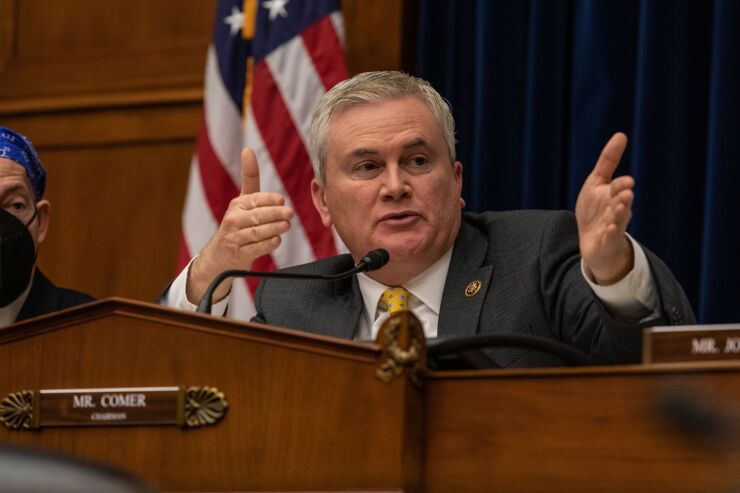The bulk of the whopping $4.6 trillion of COVID-19 relief allocated since the onset of the pandemic has been obligated and spent, though $90.8 billion remains available and roughly $24 billion of unobligated funds have now expired.
That's according to a Feb. 28
The latest snapshot, which tracks through Jan. 31, grew out of a House Oversight and Accountability Committee hearing in February during which Republican lawmakers targeted waste and fraud and raised questions about how much of the money remains unobligated or unspent.
Some Republicans also criticized the way states and cities are spending the money, and the head of the GAO said at the hearing the office was looking into the issue.
The GAO snapshot for the first time breaks out the amount of unobligated pandemic fund programs that are expired or unexpired, said Kristen Kociolek, a director of financial management and assurance at GAO.
"We got a lot of questions on that, specifically related to the expired and unexpired funds," during the hearing, Kociolek said. The latest report is "really getting at an aspect of how available the funding is to the agency or department to obligate."
Since 2020, the government has allocated $4.6 trillion in pandemic aid to state, local, tribal, and territorial governments, businesses, and individuals.
Stepped-up scrutiny of the money comes as Congress gears up for a debate over government spending and raising the debt ceiling. Republican leaders in the House have targeted fraud and waste of pandemic funds as an example of inefficient government and warned that they may try to claw back funds that remain unspent or that cities or states have spent in ways that the GOP says aren't in line with pandemic recovery or relief.

The issue is important enough that the House Oversight Committee made it the focus of their first hearing of the 118th Congress, said chair Rep. James Comer, R-Ky., at the Feb. 1 hearing.
"Today's hearing is a first step in examining the massive fraud, waste and abuse of the COVID spending programs," Comer said, adding the committee "will be holding many more hearings" on the topic.
During the hearing, Comptroller General Gene L. Dodaro presented a
The report included appendix tables on how much of the unobligated funds have expired, which lawmakers zeroed in on, Kociolek said.
The largest unexpired unobligated balance was in the public health and social services emergency fund, which has $20.6 billion unobligated of a total of $345.7 billion. The transit Infrastructure Grants program has $3.7 billion of unobligated funds out of the $69.5 billion provided. Emergency Rental Assistance has $5.5 billion remaining, the GAO found.
Most of the fraud occurred in the Unemployment Insurance and Paycheck Protection Programs, witnesses said at the hearing.
Some Republicans targeted what they called "improper" use of funds by cities and states.
"We saw the state of Washington send out $128 million in $1,000 payments to 120,000 illegal immigrants," said Rep. Gary Palmer, R-Ala. "We saw Colorado Springs use $6.6 million to put an irrigation system at two local golf courses, and $5 million [by] the state of Massachusetts to pay off debts incurred by Edward N. Kennedy Institute," Palmer said. "I mean, I know we wanted to give them flexibility, but isn't that a little bit out of the box?"
"Yeah, well, there are broad uses authorized in the legislation for that money," Dodaro said in response. "We're looking at it, right now. And so, we'll try to identify those areas that may be out of bounds, legally. But it reminds me of the Recovery Act when there was a lot of questions about the use of the money, whether that was appropriate or not when it was really, you know, legally authorized because the government gave great flexibility to the state and local community to make decisions," Dodaro said. "The other issue you have to deal with always with the money at the state and local level is fungibility of the money."
The Feb. 1 GAO report includes a note saying that the office has "ongoing work reviewing how selected states planned for, used, and managed COVID-19 relief funding across selected programs as well as any related challenges. In addition, we have ongoing work reviewing COVID-19 relief funding received by U.S. territories."





